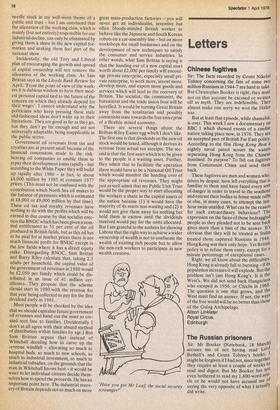Chinese fugitives
Sir: The facts recorded by Count Nikolai Tolstoy concerning the fate of some two million Russians in 1944-7 are hard to take. But Christopher Booker is right; they must not on that account be excused or written off as myth. They are indefensible. They almost make one sorry we won the Hitler war.
But at least that episode, while shameful, is over. This week I saw a documentary on BBC 1 which showed events of a similar nature taking place now, in 1978. They are an accepted part of British Far East policy?. According to the film Hong Kong Beat a nightly naval patrol scours the waters separating Hong Kong from the Chinese mainland. Its purpose? To fish out fugitives from Communist China and send thefil back.
These fugitives are men and women who, driven by despair, have left everything that is familiar to them and have faced every sort of danger in order to travel to the seashore and entrust their bodies to home-made rafts or else, in many cases, to attempt the ten' hour swim unaided. What can be the reason for such extraordinary behaviour? The expression on the faces of those bedraggle° people as they pleaded not to be sent back gives more than a hint of the answer. It obvious that they will be treated as Stalin treated those captured Russians in 1944. Hong Kong was their only hope. Yet British policy is to refuse them entry, except for a minute percentage of exceptional cases. Right, we all know about the difficulties. Hong Kong is already full to bursting — if its population increases it will explode. But the problem isn't just Hong Kong's. It is the
West's. We did not send back Hungarians who escaped in 1956, or Czechs in 1968.
The question is one that grows, and the West must find an answer. If not, the waYs of the free world will be no better than those of the Gulag Archipelago.
Alison Linklater Royal Circus, Edinburgh


































 Previous page
Previous page